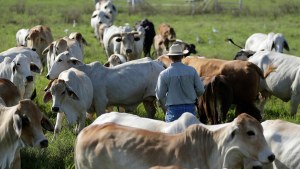Storming the Barricades: Young People Take Action
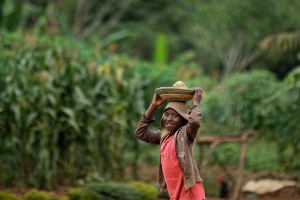 Play Podcast
Play Podcast
Young people are the future of the agriculture industry, and they are starting to take action. From studying agriculture in school to innovating real-world solutions on farms, they are making change in the here and now. In the last episode of our limited podcast series Youth in Agriculture: Transforming Local Food Systems, Promise Adesokan and Lawrence Haddad discuss different ways young people are getting engaged and the changes they are spearheading.
[Intro music.
Natalie Burdsall: INTRO: Hello and welcome to the limited podcast series “Youth in Agriculture: Transforming Local Food Systems,” produced by the Chicago Council on Global Affair’s Center on Global Food and Agriculture. Today, we will be listening in on a conversation between Promise Adesokan, a soilless farmer, and Lawrence Haddad, the Executive Director of Global Alliance for Improved Nutrition, also known as GAIN.]
Promise Adesokan: I am Promise Adesokan a student of Ladoke Akintola University of Technology, for short LAUTECH, Nigeria. So, also currently interning as GCSAYN, that's Climate Smart Agriculture Youth Network Global, and it's a privilege to be having this conversation with you.
Lawrence Haddad: Yeah, well thank you. Promise. Nice to hear you and thank you for asking me to do this. And thank you, Natalie, for organizing it. Well, maybe I can ask the first question to Promise and that is why—why are you doing this? Why do you... what do you want to get out of this conversation?
Promise Adesokan: Out of this conversation... I also came with the expectation to learn because I know that we have great minds here. Like I've checked your profile and it's really mind blowing. I really appreciate what you've been doing. But I also like to share my experience on my interests and what I've done so far leads to, what I've done so far in my community and also to learn from... to also learn from you.
Lawrence Haddad: Okay, thank you. I joined the call when Natalie invited me because I usually learn something from people who are beginning their journey, like you, and I get a different perspective. And I just think it's part of my own responsibility to, you know, impart whatever experience and knowledge I have to someone starting out. So that's why I'm very happy to do this. So, and actually maybe you could give us a question to get us going.
Natalie Burdsall: Absolutely. So, one of the biggest things we've been talking about in these conversations is essentially how to get youth involved in agriculture, and how to create a smoother transition between established professionals and young people who are wanting to break into the field. So, that said, what do you think is the best way to get young people engaged in food and agriculture?
Lawrence Haddad: You know, I think the best way is for them not to wait to be invited. It's just to kind of storm the barricades, if you know what I mean, and just do it. So, reach out to people like me and others and say, “I'd like to be on... I'd like... I've got something to say on a panel.” Or if there's an event. Or reach out on social media. One of the one of the young people we recruited at GAIN from Kenya—she's 23, I think—she reached out to me via Twitter. And then, you know, I put her in touch with our Kenya country director and I said, you know, “The next time there's a vacancy, apply for this apply for the position.” And, so, she talked to the Kenya country director. The Kenya country director understood what she had to bring to the table. The Kenya country director told her a bit about GAIN and she was able to apply successfully for a position at GAIN. And she was... she also runs a small NGO in a community which works with smallholder women farmers to produce vegetables. So, that wouldn't have happened unless she'd reached out to me over social media. So, I think you do need to show initiative, but you also do need to find somebody who's willing to engage with the person. So that's one route. I think the other route is to write blogs, write op eds—you know, small 500-word opinion pieces for your local newspapers. If they don't publish them, just publish them on... set up your own website and publish your own blog. It's quite easy to do.
I think there are lots of things you can do. But you have to... you have to do your research and try and find people who are more experienced who you think will be receptive to the initiative that you have to show. So that's my... that's my starting response. What do you think, Promise? Does that sound practical or does it sound kind of like pie in the sky, if you know what I mean?
Promise Adesokan: It's really practical. It is. But I feel like in some countries, like I use Nigeria as an example, because I can only know much about Nigeria because I'm Nigerian. I feel like ignorance is kind of the order of the day in Nigeria and agriculture is like a profession that people... people tend to believe like agriculture is a dirty job and it is not like career that you can actually take for a long time. So they feel like people in agriculture are poor and that's because of what we've been saying. So, majority of people are not exposed to the brighter part of agriculture, and we tend to see agriculture as maybe quote unquote last or something, because that's like the major... people use agriculture... how agriculture now is evolving to technology in which it is expensive for the masses to take into. So, I feel like if there is more of advocacy, letting people know that okay this... okay, agriculture is not only seen in this, in this parts in which we all believe it to be as a dirty job, okay, we can also do agriculture in other ways. Like you could... if we're going to soil expanding hydroponics and the likes and still come out successfully, you can only come out and say to yourself like, “I do agriculture. I am a farmer.” Like you can choose it that the profession not just like a hobby or a break or something. So, I feel like if we can have more of advocacy we can have more people talking about agriculture. If we can have more practical example... physical or... example where people can say, okay, it is also done this way because... let me use myself as an example. I also view agriculture in that aspect. I did my internship at the Soilless Farm, that was last year, 2022, and then I saw how everything was done. Even I had to start asking myself that is this the same Nigeria that we've already been that they are doing this? So I feel like majority of people are not youths in general. And our adults and women in agriculture are not exposed to these things. So we don't have involvement... and youth involvement in these things. So I feel like you can have more people. That's why I feel like if we can have more youth like myself and friends that we can come out to okay advocate agriculture and make it a sustainable profession. People... I feel like it's so we can better the food system.
Lawrence Haddad: Yeah, I, you know, I've known... I've learned a lot about agriculture from books. I'm an agricultural economist. But the most I ever learned about farming and agriculture is by talking to farmers. So, I was just in Rwanda in March and talking to a group of African... of Rwandan farmers and I was just, you know, always amazed at how much I learn about, you know, why can't they grow? You know, I'll come in and say, “Why can't you grow more diverse crops?” And they'll tell me why. You know, the government doesn't allow us to, or we get subsidies for these crops, but not for these crops. Or there was a big... there was big insect infestation three years ago in this crop or these crops. People don't trust, don't want... don't buy them because they think they have tons of pesticides on them, or we grow them because we can get export revenue from them in DRC. I mean, it's very practical. Farmers are very practical people and they're very... they're very responsive to price signals they get for the inputs they buy and the outputs they sell. And so my, you know, the first thing I would do is just—and you maybe you've already done this, Promise—you just talk to as many farmers as you can possibly talk to. They, the farmers, tend to be older certainly in Sub-Saharan Africa, I'm generalizing but in general they tend to be older, unless they're in something like hydroponics or vertical farming or something like that, but they tend to be older, but when you talk to the... it's important to think of agrifood systems as not just farms, it's the processes, the storage, the distribution, that stuff, you know and those... and the people who run those small and medium enterprises are often younger and very entrepreneurial as well. And, you know, they're doing it not because they think food is... they're not doing it because... and farmers are not in that business because they have some... they're doing it from the goodness of their heart. They're doing it because they need to earn a living. They need to earn a livelihood, an income, a wage, and that's why they're doing it. So I think, I think it's really good to first thing is to talk to as many people in the in the business as possible. That gives you a kind of superpower that many people, even people like me, we don't have that day-to-day or month-to-month familiarity with farmers and people in the food system. So, I think that's your superpower. Keep topping up your knowledge, not just of the theory but of the practice. I would say that's the first thing I would say.
Then I would say the second thing is, there are organizations—I can think of one in Ethiopia called Blue Moon. There's one in Nigeria called Nourishing Africa—and they are trying to find... they are trying to really make it easier for small businesses, small farmers in the food sector, to become profitable. They're helping these small businesses, whether they're farmers or processors or millers or storage transport, companies, vendors—they're trying to help them kind of get their business models in order to develop, you know, how do you, how do you get an investor interested in your company? How do you apply for credit?
So, this is the second route. The first route is get to know your farmers, get to know your small and medium enterprises. The second route is find a... find an organization that is sympathetic and interested in the next generation of people who want to be in the farming system and begin to build your networks. Begin to build relationships with those people.
I think this is, you know, what you're doing, is what you need to do. You need to reach out to people. You need to tell them about your interests because they don't know about you. So you've got to make yourself really visible and you've got to say, “This is who I am, this is what I'm interested in,” and ask for advice. People love to be asked for advice. Most people. Most people will give you advice. Some people will be rude and ignore you. But don't get discouraged by that. Just keep going and you'll find somebody who will give you advice. And you just got to keep kind of working in those relationships. It probably shouldn't be that difficult but it's not easy, but you've just got to make it happen.
Promise Adesokan: For what I said earlier on, like how my interests came in, so I was able to... I start... I started building a small community, a community because I also I'm also into tech, like I do product designing. I just started learning the same last this year. So I'm trying to build like an interface that will be sustainable in Nigeria to help in distribution of agricultural producers because they are actually some areas, like the rural area, that they experience food waste due to lack of markets and they don't... they are not exposed to the right markets, they don't know how to sell their produce. So there are some farmers in the rural area that actually do large scale farming, but in long run they tend to waste their food due to lack of proper marketing. So, I'm trying to bridge the gap by maybe creating a website where farmers could register their farms and we could offer logistics and go to the both interstates, anywhere the farm is, pick up the produce to help consumers get food directly. The focus is basically on vegetables like production of lettuce, cabbage, carrots, bell peppers and the likes. Different varieties of tomato, beef, steak and the likes.
Lawrence Haddad: I think what you're focusing on is very good because there are... there's massive... so food loss is when you know between... food loss is harvest... at harvest time, and then in getting the food to the market. Lot of food loss in Nigeria, maybe up to 50 percent. And then there's food waste, once you've once you've purchased the food, and it's probably much less of that. That tends to be a big issue in the Europe and North America. But food loss is a big issue in Nigeria, and there are there are groups that are working on how to use technology like solar panels and community refrigeration units, community cold chains or cold storage to reduce that. And so again, I think that's a big issue.
Natalie Burdsall: I want to thank you both, Promise and Lawrence, for providing your thoughts and insights on youth engagement in global food and agriculture.
[Natalie Burdsall: OUTRO: And thank you for tuning in for this episode of “Youth in Agriculture: Transforming Local Food Systems.” As a reminder, the opinions you heard belong to the people who express them, and not the Chicago Council on Global Affairs. This episode is produced and edited by me, Natalie Burdsall. Thank you for listening.
Outro music.]






Other Episodes
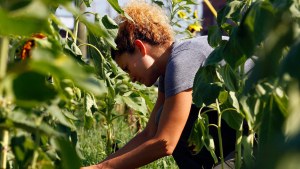 Food and Agriculture
Food and Agriculture
The agriculture industry must actively engage young people if there is any hope of ending food insecurity.
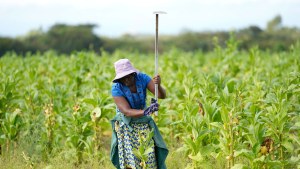 Food and Agriculture
Food and Agriculture
To ensure the sustainability of the global food and agriculture system, farmers must embrace diversification.
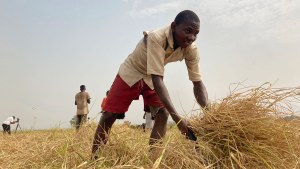 Food and Agriculture
Food and Agriculture
We need smart and efficient food systems to preserve the Earth—are young people the silver bullet?
